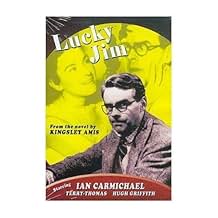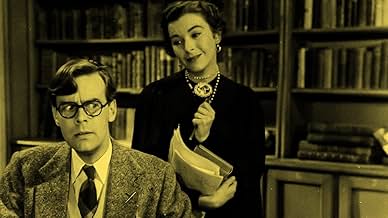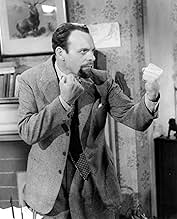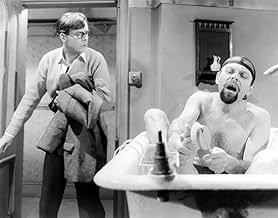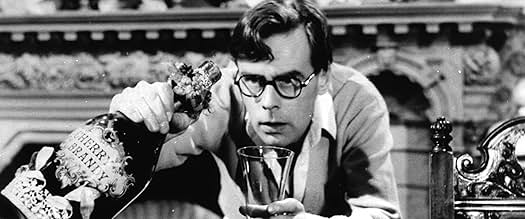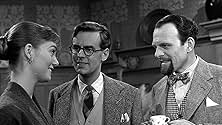Jim Dixon struggles with university work, Professor Welch's boring behavior, and his neurotic friend Margaret Peel. His misery is further complicated by his son Bertrand and companion Christ... Read allJim Dixon struggles with university work, Professor Welch's boring behavior, and his neurotic friend Margaret Peel. His misery is further complicated by his son Bertrand and companion Christine Callaghan.Jim Dixon struggles with university work, Professor Welch's boring behavior, and his neurotic friend Margaret Peel. His misery is further complicated by his son Bertrand and companion Christine Callaghan.
- Director
- Writers
- Stars
John Welsh
- The Principal
- (as John Welch)
Henry B. Longhurst
- Professor Hutchinson
- (as Henry Longhurst)
- Director
- Writers
- All cast & crew
- Production, box office & more at IMDbPro
Featured reviews
It's hard for me to be objective about this film, as it is adapted from my favorite novel--which I've read eight or nine times. Also, I waited so long to see it that it may have been inevitable that I would ultimately be disappointed. Ironically, I first heard about the film some years before I read the book, and it was only after I read the book that I made the connection between it and the description my brother had once given me. It would be about 20 years (no kidding!) before I finally saw the film myself. I've now seen it twice and mostly hated it both times.
Kingsley Amis's LUCKY JIM was obligatory reading among history students when I was in grad school 30 years ago. The story about an unhappy history instructor in a crummy British provincial university expressed a lot of the angst that we felt as grad students, and it was funnier than heck as well. I loved the book then, and still love all these years later. Why, then, was the film such a disappointment? Mainly because the script muted much of the savageness of Amis's humor, and because it tacked on an idiotic chase scene at the end that has nothing whatever to do with the original story--or even with what goes before it in the film. (Even Ian Carmichael--who played Jim--hated that ending. He told me that the people making the film didn't seem to have any idea of what they were doing--and it shows.)
The producers also added a very unsatisfactory and irrelevant academic procession in them middle of the film--evidently for the sole purpose of making Carmichael look like a klutz by having him tripping over flowerpots and dropping things in the middle of the solemn affair.
Nevertheless, the film does have its virtues, chief among them is excellent casting. Ian Carmichael was born to play Jim. Terry-Thomas was properly unctuous as Bertrand; Hugh Griffith certainly looked the part as Professor Neddy; Maureen Connell looked like I imagined the neurotic Margaret Peel; and Sharon Acker made a fine-looking Christine Callaghan.
Kingsley Amis's LUCKY JIM was obligatory reading among history students when I was in grad school 30 years ago. The story about an unhappy history instructor in a crummy British provincial university expressed a lot of the angst that we felt as grad students, and it was funnier than heck as well. I loved the book then, and still love all these years later. Why, then, was the film such a disappointment? Mainly because the script muted much of the savageness of Amis's humor, and because it tacked on an idiotic chase scene at the end that has nothing whatever to do with the original story--or even with what goes before it in the film. (Even Ian Carmichael--who played Jim--hated that ending. He told me that the people making the film didn't seem to have any idea of what they were doing--and it shows.)
The producers also added a very unsatisfactory and irrelevant academic procession in them middle of the film--evidently for the sole purpose of making Carmichael look like a klutz by having him tripping over flowerpots and dropping things in the middle of the solemn affair.
Nevertheless, the film does have its virtues, chief among them is excellent casting. Ian Carmichael was born to play Jim. Terry-Thomas was properly unctuous as Bertrand; Hugh Griffith certainly looked the part as Professor Neddy; Maureen Connell looked like I imagined the neurotic Margaret Peel; and Sharon Acker made a fine-looking Christine Callaghan.
Planned as a follow-up to PRIVATE'S PROGRESS (1956), the Boulting Brothers' version of the Kingsley Amis classic substitutes physical comedy for much of the novel's satire. Ian Carmichael plays Jim Dixon as an amiable dolt, well-meaning but hopelessly lost in a faculty world of would-be Oxbridge dons. Professor Welch (Hugh Griffith) comes across as forgetful yet obsessive; his wife (Jean Anderson) as an incorrigible snob; and their son Bertram (Terry-Thomas) as a pretentious layabout. They inhabit a world of the past, dominated by images of 'Merrie England' - an idealized version of history that in Dixon's view never existed. By contrast Dixon tries to inspire his learners by encouraging them to speculate on alternative versions of the past. The film's enduring theme ("Oh, Lucky Jim!") by John Addison offers an ironic counterpoint to many of the protagonists' misadventures; he is clearly NOT lucky in many of the things he does - for example, bringing a bulldog into the Welches' front room to disrupt their evening concert, or creating total anarchy in the middle of a procession dedicated to the new Chancellor's (Clive Morton's) inauguration. Carmichael possesses a certain degree of comic talent as the innocent lost in a world of pseudo-sophisticates, but the Boultings' attempt to turn him into a Keatonesque figure, complete with a repertoire of India-rubber facial expressions, falls rather flat. The film ends happily with Dixon getting the girl (Sharon Acker), but only after a chase-sequence involving a series of unconvincing studio shots that seems out of place in terms of the film as a whole. It's nice to see him get the better of the Welch family, but we don't get the sense that he is in any proud of his grammar school education which (in terms of the novel at least) is particularly important at the time of the film's original release, when redbrick universities were offering greater opportunities to people from all social backgrounds to advance themselves. The Welch family might not like these social upstarts invading their intellectual space but, in terms of British history as a whole, they were the future while the Welches represented the past.
Kingsley Amis might not had liked the adaptation of his novel set in a redbrick university in 1950s Britain when university education started to expand and took on some working class students. The Boulting brothers film comes across a little too much of an Ealing comedy for my liking with slapstick and loses the novel's edge.
Ian Carmichael is the northern grammar school boy made good but looking for a permanent teaching job at the university. To do this he has to toady to Professor Welch and his family and every task he is entrusted to do ends in disaster sometimes due to Jim's shortcomings.
As a lecturer Jim is passionate with a leftist slant on history in contrast with Professor Welch dull and old fashioned musings which we see when Jim has to deliver Welch's lecture.
In between we have Jim getting into escapades with Terry Thomas and his Canadian girlfriend and a slapstick scene involving a parade with flowers on the quadrant of the university.
However whilst Carmichael is spirited as Jim he looks too old, even worse Terry Thomas looks too old as the son of the Professor Welch.
The film is episodic and although starts promisingly enough it tries too hard to be an Ealing style comedy rather than a satirical adaptation. The redbrick university never convinces maybe I have seen too many of these places that were built in the 1960s.
Ian Carmichael is the northern grammar school boy made good but looking for a permanent teaching job at the university. To do this he has to toady to Professor Welch and his family and every task he is entrusted to do ends in disaster sometimes due to Jim's shortcomings.
As a lecturer Jim is passionate with a leftist slant on history in contrast with Professor Welch dull and old fashioned musings which we see when Jim has to deliver Welch's lecture.
In between we have Jim getting into escapades with Terry Thomas and his Canadian girlfriend and a slapstick scene involving a parade with flowers on the quadrant of the university.
However whilst Carmichael is spirited as Jim he looks too old, even worse Terry Thomas looks too old as the son of the Professor Welch.
The film is episodic and although starts promisingly enough it tries too hard to be an Ealing style comedy rather than a satirical adaptation. The redbrick university never convinces maybe I have seen too many of these places that were built in the 1960s.
Lucky Jim is directed by John Boulting and adapted from the Kingsley Amis novel of the same name. It stars Ian Carmichael, Terry-Thomas, Hugh Griffith, Sharon Acker and Jean Anderson.
A Redbrick university In Britain's New Elizabethan Age: Here Are Moulded The Intellectual Drakes And Raleighs Of Tomorrow-Fearless, Independent- -
And State Supported!
Enter Carmichael's accident prone Jim Dixon, who in order to keep his job at the University has to do the bidding for Griffith's dull Professor Welch. Worse still, maybe, is having to spend time with his boorish family, especially the Son, pompous show off Bertrand (Thomas). Salvation may come in the form of Bertrand's companion, though, Christine Callaghan (Acker)?
I haven't read the Amis novel this is based on, so can't have frame of reference there. By all accounts it's very different, and staunch Amis supporters are very dismissive of the Boulting movie. The film itself is hardly prime Boullting Brothers, who would produce British classics such as Brighton Rock and I'm All Right Jack, but it has a number of funny scenes whilst also being nicely flecked with satirical flavouring. Carmichael attacks the lead role with gusto and comic affability, while "scary eyebrows" Griffith and Terry-Thomas provide good comedy footings for Carmichael to work from. The ladies are pretty and effective enough, without really doing anything any other British actress of the time couldn't have done, but all told it's a well acted and genial time filler for the undemanding. 6.5/10
A Redbrick university In Britain's New Elizabethan Age: Here Are Moulded The Intellectual Drakes And Raleighs Of Tomorrow-Fearless, Independent- -
And State Supported!
Enter Carmichael's accident prone Jim Dixon, who in order to keep his job at the University has to do the bidding for Griffith's dull Professor Welch. Worse still, maybe, is having to spend time with his boorish family, especially the Son, pompous show off Bertrand (Thomas). Salvation may come in the form of Bertrand's companion, though, Christine Callaghan (Acker)?
I haven't read the Amis novel this is based on, so can't have frame of reference there. By all accounts it's very different, and staunch Amis supporters are very dismissive of the Boulting movie. The film itself is hardly prime Boullting Brothers, who would produce British classics such as Brighton Rock and I'm All Right Jack, but it has a number of funny scenes whilst also being nicely flecked with satirical flavouring. Carmichael attacks the lead role with gusto and comic affability, while "scary eyebrows" Griffith and Terry-Thomas provide good comedy footings for Carmichael to work from. The ladies are pretty and effective enough, without really doing anything any other British actress of the time couldn't have done, but all told it's a well acted and genial time filler for the undemanding. 6.5/10
Kingsley Amis's first and best novel drew much satirical thrust from its evocation of the late 1940s, when British idealism about the socialist government elected in the first flush of World War Two victory was petering out. The ex-communist university lecturer Amis's ambiguity about putting The People in charge- later expressed in a vehement rejection of educational egalitarianism- is already implicit in this campus chronicle.
The Boulting Brothers, themselves on the left, worked "Lucky Jim" into the mildly satirical cycle of movies which made them the main successors to Ealing in the 1950s and early 1960s. But by updating it to the present and filling it with their rep company of character actors, they lost the plot.
Written by the newspaper humorist Patrick Campbell, this picturisation skates over the hypocrisy of Professor Welch and his clan as moneyed leftists-- an early depiction of limousine liberalism-- and concentrates on slapstick. Ian Carmichael, whose northern accent comes and goes, is too posh to play a grammar school lad who has blundered into the wrong profession. Terry-Thomas is too old and too T-T ("extra-ordinary fellah!") for Bertrand Welch, the spoilt son-- and why make him a novelist rather than a painter, when visual fun could have been had with his awful daubs to make up for the absence of Amis's authorial voice?
Most of the novel's heft comes from the gap between Jim Dixon's forced toadying and his secret derision, expressed in making faces and fantasising elaborate practical jokes. Little of this can get through in a script which majors on pratfalls and all-too-Britishly endorses Jim as the good guy by having the Welch's dog adopt him. And the provincial campus is too grand for the era of austerity and demobbed students Amis imagined, as though the Boultings secretly hankered to relocate the tale to Oxbridge.
All that said, there are incidental pleasures. Hugh Griffiths is spot-on as "Neddy" Welch, as is his namesake Kenneth as the creepy Evan Johns. Unexpectedly, given the initial compromises, the denouement (which was slapstick in the book too) gets closer to Amis's acrid eloquence, although drunks on screen become tiresome faster than directors realise. Interestingly in view of Amis's later problems with American publishers, the Boultings tone down the novel's misogyny. Margaret Peel is less neurotic, predatory and manipulative in the film. Jim's love object Christine, alas, is a tittering cipher on both page and screen. The British cinema wasn't doing sex in the Fifties unless it was "exposing" tarts in Soho.
The Boulting Brothers, themselves on the left, worked "Lucky Jim" into the mildly satirical cycle of movies which made them the main successors to Ealing in the 1950s and early 1960s. But by updating it to the present and filling it with their rep company of character actors, they lost the plot.
Written by the newspaper humorist Patrick Campbell, this picturisation skates over the hypocrisy of Professor Welch and his clan as moneyed leftists-- an early depiction of limousine liberalism-- and concentrates on slapstick. Ian Carmichael, whose northern accent comes and goes, is too posh to play a grammar school lad who has blundered into the wrong profession. Terry-Thomas is too old and too T-T ("extra-ordinary fellah!") for Bertrand Welch, the spoilt son-- and why make him a novelist rather than a painter, when visual fun could have been had with his awful daubs to make up for the absence of Amis's authorial voice?
Most of the novel's heft comes from the gap between Jim Dixon's forced toadying and his secret derision, expressed in making faces and fantasising elaborate practical jokes. Little of this can get through in a script which majors on pratfalls and all-too-Britishly endorses Jim as the good guy by having the Welch's dog adopt him. And the provincial campus is too grand for the era of austerity and demobbed students Amis imagined, as though the Boultings secretly hankered to relocate the tale to Oxbridge.
All that said, there are incidental pleasures. Hugh Griffiths is spot-on as "Neddy" Welch, as is his namesake Kenneth as the creepy Evan Johns. Unexpectedly, given the initial compromises, the denouement (which was slapstick in the book too) gets closer to Amis's acrid eloquence, although drunks on screen become tiresome faster than directors realise. Interestingly in view of Amis's later problems with American publishers, the Boultings tone down the novel's misogyny. Margaret Peel is less neurotic, predatory and manipulative in the film. Jim's love object Christine, alas, is a tittering cipher on both page and screen. The British cinema wasn't doing sex in the Fifties unless it was "exposing" tarts in Soho.
Did you know
- TriviaAt 46 Terry-Thomas was a year older than Hugh Griffith, who played his father. Jean Anderson, playing his mother, was only 4 years older than Thomas.
- GoofsThe taxi used by Jim and Christine when leaving the ball has 'Taxi' on a paper sign in the windscreen which is not there in long shot.
- Crazy creditsOpening credits prologue: A Redbrick University in Britain's new Elizabethan age: here are moulded the intellectual Drakes and Raleighs of tomorrow - fearless, independent - and state supported
- ConnectionsReferenced in The Bill: Lucky Jim (1999)
- How long is Lucky Jim?Powered by Alexa
Details
- Release date
- Country of origin
- Language
- Also known as
- Volltreffer ins Glück
- Filming locations
- The Royal Masonic School, Bushey, Hertfordshire, England, UK(red-brick university where Jim works)
- Production companies
- See more company credits at IMDbPro
- Runtime
- 1h 35m(95 min)
- Color
Contribute to this page
Suggest an edit or add missing content

